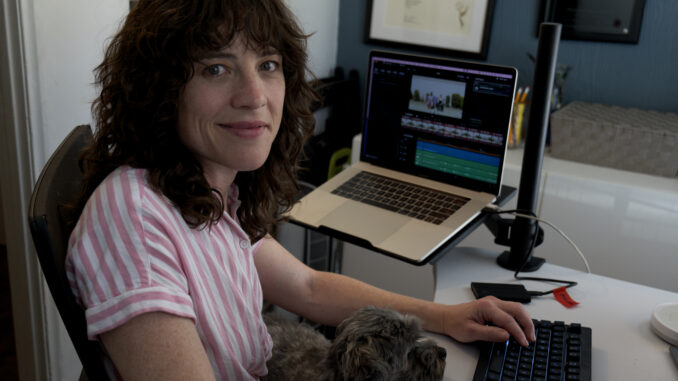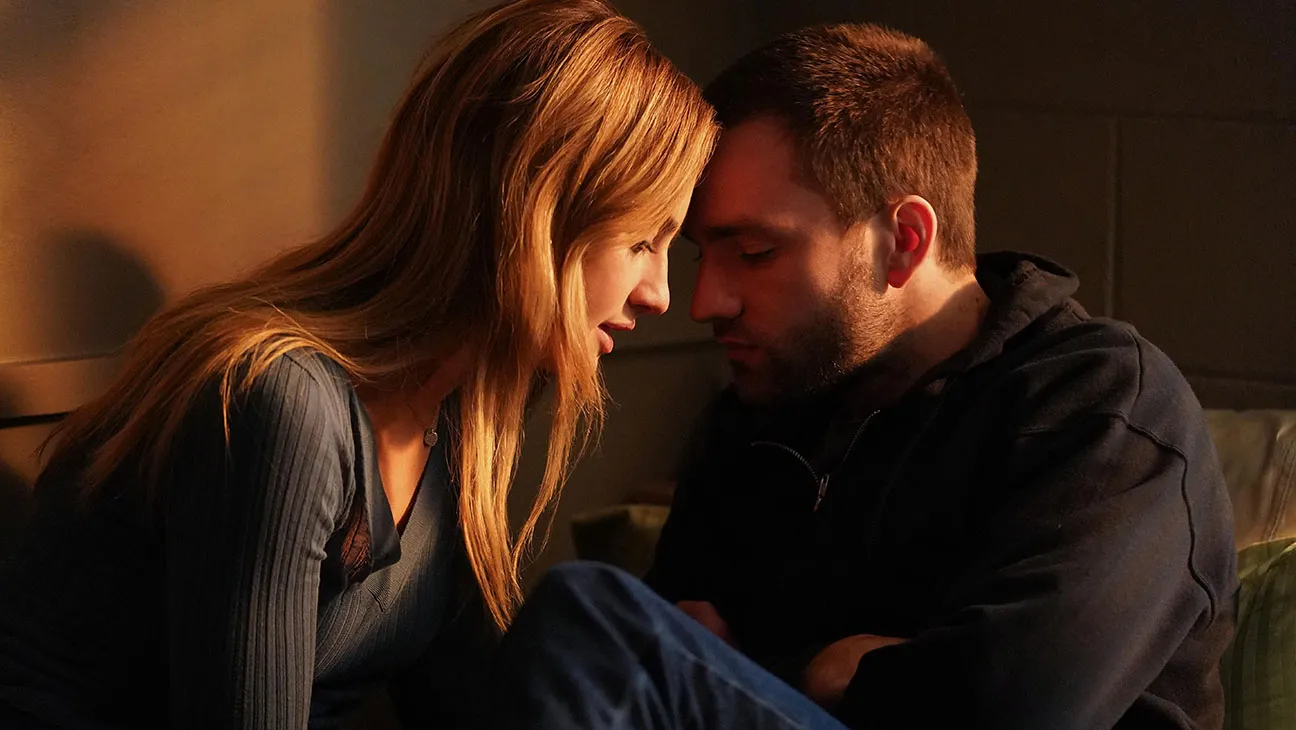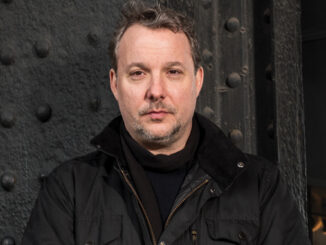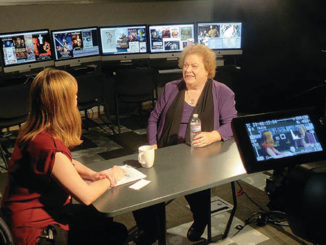
By Patrick Z. McGavin
Picture editor Julie Cohen could not resist the urge to return for a second season of the Hulu series, “Tell Me Lies.”
After cutting the pilot, episodes three and seven and the finale of the debut season in 2022, Cohen is back with a vengeance, having worked on Episodes Two and Five plus the finale of the eight-part limited series about a twisted modern romance.
Adapted by showrunner Meaghan Oppenheimer from the 2018 novel by Carola Lovering, the series oscillates between eight-year time frames, looking back at the relationship of Lucy Albright (Grace Van Patten) and Stephen DeMarco (Jackson White) during their college years.
CineMontage: What originally drew you to the show two years ago?
Julie Cohen: I fell in love with the scripts and I really wanted to help bring the story to life and help them find the tone. I really believed in what Meaghan Oppenheimer, the showrunner, was doing.
The pilot was obviously hard at establishing the tone. It was a fairly internal story. We had to do some work to figure out how best to tell the story of what was going on in Lucy’s head when she first saw Steven at the wedding party in 2015. We know it’s traumatic, but we don’t know why exactly. We had to kind of build that out, and that was really fun to do.
When I first signed on, I only had read the pilot script, but then I got sent all the rest of the scripts. I was so blown away at the consistency in the writing, especially in terms of the tone. Every episode had me wanting to read more.
CineMontage: As a picture editor, what is the great challenge of coming back to very specific material a second time?
Cohen: I think every show has its own language, has its own pace. One of the bigger challenges in going back to a show is just getting back into the language and the pace of that show.

This show is more of a drama and is more about the subtlety, and it’s more about holding on moments and trying not to cut, and really seeing the very minute differences in performance between takes and making sure that the performance is as cohesive as possible among the different setups. Because I had been on [the show] since the pilot, I’m very familiar with the language that we set up and why we set it up that way.
CineMontage: How would you characterize the language of the show?
Cohen: It’s a sexy college drama. It’s about a toxic relationship at the center of it, and how that affects these young people in college. They’re all young, and they’re all making choices that are going to affect the rest of their lives. They’re kind of creating the baggage that they’re going to be carrying around the rest of their lives. I think it’s about exploring that and exploring how some dynamics and decisions you make at that age can have ramifications.
CineMontage: Series are built on familiarity and audience identification. Were there specific things you and the filmmakers wanted to do to change things up?
Cohen: I think that it was right there in the scripts for Season Two. They really took all of the characters to that next place, and they were page turners. So, there’s a lot of plant and payoff, there’s a lot of surprises and twists, and things are not always what you think they are. And so I think just making sure that we stay true to those twists and to the spirit of all of the characters, I think that was something that we really tried to do this season.
There’s also some callbacks to things we set up in Season One, which I think will be exciting for the audience to catch. So much of the show is about nostalgia because it takes place in 2007 and 2008 as well as the 2015 framing device. A lot of what we’re doing is bringing you back to a specific time in 2007 and 2008, a really emotional time for these characters.
CineMontage: The central relationship is either messy and complex or toxic and unhealthy. How do you negotiate between these very different emotional registers?
Cohen: Both of the lead characters, Stephen and Lucy, have a lot of trauma in their pasts. The way they act, a lot of that is informed by that trauma. So they play into each other and push each other’s buttons. Certainly Season One was a little bit more of a love story, and Season Two is a little bit more of a war story.
So for both of them, it’s not just about what they do to hurt each other, it’s also about their own histories and the place from which all of the anger and distrust is coming from.
CineMontage: What for you has been the most revealing or surprising part about returning to these characters and their stories?
Cohen: The second episode this season had a sexual assault. I’m very proud of the editing in that scene. It’s super complicated. It takes place in 2008, before the #MeToo movement took off, when it was more culturally acceptable to ignore or minimize inappropriate behavior and sexual assault.
I think just being sensitive to that story and the performances were just heartbreakingly beautiful for that storyline. I felt really lucky to be able to put that together. It was definitely something that took a lot of care to just make sure that we were really showing the story realistically, not overdramatizing it, but also giving it the weight it deserves.
CineMontage: The show is adapted from a novel by a woman, with a woman showrunner, and has a very compelling young woman as the dramatic centerpiece. Was that something that had importance and value for you?
Cohen: Absolutely. I’m really dedicated to telling female stories that haven’t been told before. This is a story about relationships, about women coming of age in college, about trauma and toxic relationships and those dynamics that really have a strong female perspective. It was really important for me to be a part of it.
With Season Two dealing with sexual assault, I felt very lucky to be able to tell that story. I feel like that story is told in a way that I have not yet seen on TV. The response by Pippa (Sonia Mena), and what happened to her is nuanced and interesting, and I think psychologically true to the character and true to what a lot of women experience.
CineMontage: How has your approach and technique for cutting performance evolved during your career?
Cohen: I think so much of cutting performance is a guttural sense for what works. I definitely think I’m always looking to see, especially for a drama, how long can we stay in the performance without cutting in order to not make it feel contrived or manipulative.
I’ve definitely learned new tricks and new ways of conveying performance and also just being true to the performance that they’re giving you. One of the things that we sometimes do is to cut between different performances. Sometimes actors feel if they have to do multiple takes, that maybe they’re not getting it right, and they’re trying to get to some place where it’s perfect. Actually, along the way, they’re giving us some variety, and we can use that to convey a wider range of emotion in the scene.
CineMontage: You seem drawn to shows that have a very strong creative personality at the center.
Cohen: With “Tell Me Lies,” Meaghan Oppenheimer really knew what that show was from the very first script. The consistency of the writing and the tone of the show and the way we put it together, and the music and everything was really crystallized in her brain in a big way. It’s been fun to work with her to make that vision into a reality.
CineMontage: Was becoming a picture editor something planned, or more of a sideways career action?
Cohen: I grew up in Southern California. My dad was actually an optical printer and was involved in the film industry. My parents are from New Jersey, and the way the story goes is that my uncle, who was working in post-production out here, told my dad: “You should come out to LA because you can get a good paying job in a technical field without a college degree.”
We lived here until I was 15, and then moved to Florida. My mom is in the art industry, and she opened up a gallery out there. My dad was definitely supportive of me wanting to become an editor. I went to Emerson College, in Boston, and studied film. The editing class was actually full when I was there, so I audited it, which was probably the best decision of my life.
With my thesis film, there was an editor on it, but he really wasn’t into the very female, subtle story we were telling. I ended up taking over the edit. The moment that I knew I wanted to become an editor was the first time I went to cut in an Avid bay. I started working in the morning, and I got a little hungry. Then I went outside and I realized it was completely dark. The entire day had gone by, and I had no idea. That was a really magical feeling. The short film ended up winning a best editing award at my school’s film festival. I knew then that my fate was kind of written.
CineMontage: Is there something intrinsic or intuitive to your personality that the act of editing satisfies?
Cohen: Absolutely. I honestly think there’s nothing in the world that I’m better at than editing, not as a brag. It’s just that I feel when I found editing, I finally discovered something that I not only love, but that I actually am good at.
I do feel like I am an artist-editor, and I found my medium in college.
I’ve really been doing it ever since. When I moved out to LA, I got into reality TV editing and worked in that for 10 years. After that, I went back to assisting in order to get into scripted, and then moved up from there.
I love editing. There really is no more Zen feeling in the world than to be able to be creative every day and to be a part of making something that moves people and makes people laugh.
Patrick Z. McGavin is a Chicago-based cultural journalist and writer. He writes about film at his Substack newsletter, “Shadows and Dreams,” at www.patrickzmcgavin.substack.com.





